#edmund blunden
Text

Cricket to us was more than play; it was a worship in the summer sun.
Edmund Blunden
Cricket game outside Bamburgh Castle, Northumberland.
#blunden#edmund blunden#quote#cricket#english#tradition#custom#english summer#sports#bamburgh castle
63 notes
·
View notes
Text

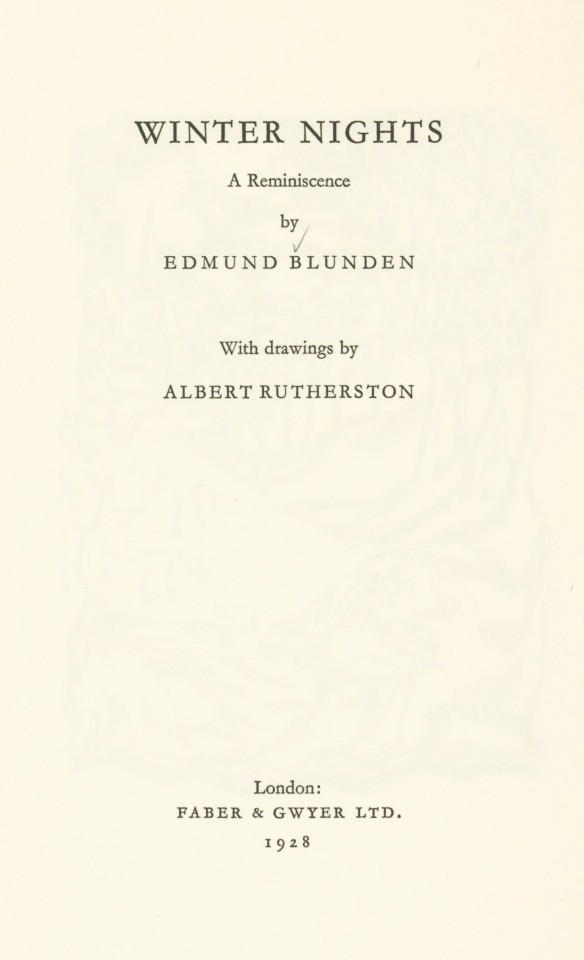
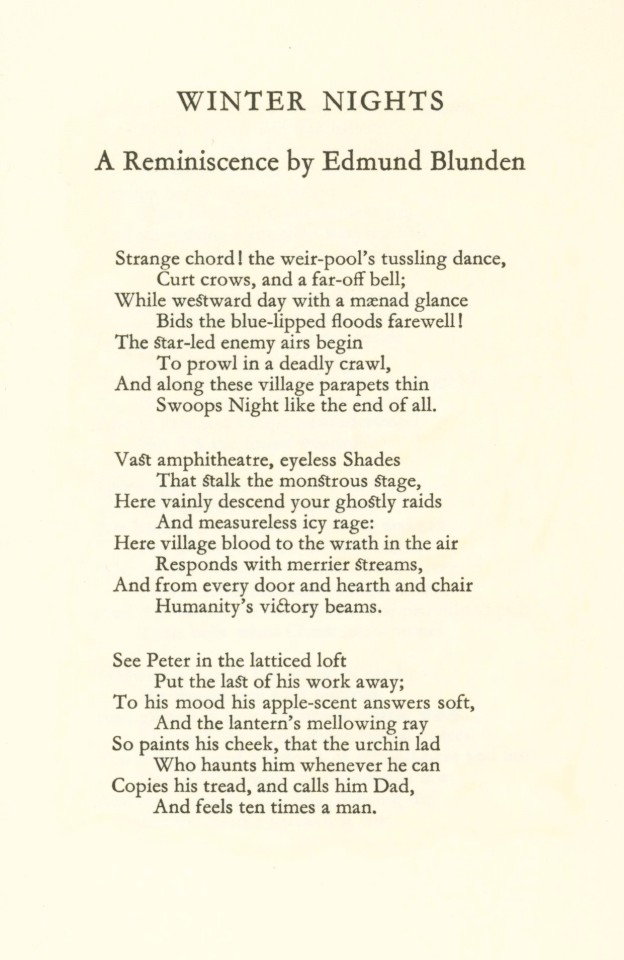


A Merry Christmas Eve
On this unseasonably warm Christmas Eve, we offer a very seasonable winter poem, Winter Nights, number 17 in The Ariel Poems series, by English poet Edmund Blunden (1896-1974) with illustrations by British artist Albert Rutherston (1881-1953) printed in London by the Curwen Press for Faber & Gwyer in 1928. It is a large paper edition printed on English hand-made paper in an edition of 500 copies singed by the poet. The Ariel Poems were a series of illustrated pamphlets containing poems published by Faber and Gwyer and after 1929 by Faber and Faber. The first series had 38 titles published between 1927 and 1931. The second series, published in 1954, had 8 titles.
Midwinter mirth! the magic of earth --
My threadbare soul rejoices,. . .
The red-screened windows of schoolhouse and inn
Dart life through the moorlands raw,
And the lovetalk, carolling, dancing din
Are the heart's invincible law.
We wish you a joyful Christmas Eve.
View other posts from the Ariel Poems series.
View more posts with poems by Edmund Blunden.
View more posts with books printed by the Curwen Press.
View our other posts from Christmas Eves past.
#Christmas Eve#holidays#Edmund Blunden#Albert Rutherston#Winter Nights#Ariel Poems#Faber & Gwyer#Curwen Press#poems#poetry#illustrations
8 notes
·
View notes
Text
A poem by R. L. Barth

A Letter to the Dead
The outpost trench is deep with mud tonight.
Cold with the mountain winds and two weeks' rain,
I watch the concertina. The starlight
Scope hums, and rats assault the bunkers again.
You watch with me: Owen, Blunden, Sassoon.
Through sentry duty, everything you meant
Thickens to fear of nights without a moon.
War's war. We are, my friends, no different.

R. L. Barth
2 notes
·
View notes
Text

On the green they watched their sons
Playing till too dark to see,
As their fathers watched them once,
As my father once watched me
Edmund Blunden
45 notes
·
View notes
Text

Undertones of War by Edmund Blunden
#i read this book around a year ago now but this has always stuck with me#edmund blunden#ww1#words & such#my posts
0 notes
Text
~ A little about my blog ~
‘What eyes, I wondered, might be watching.’ — An Ode to Antares — Alan Seeger
Ever since I first read Alan Seeger’s poetry and his published diary pages, I was hooked on poetry and was inspired to write my first poem and subsequent ones after, from the beginning of reading his words on the page. His work as well as many other works of the Lost Generation nurtured my want to learn poetry, and I began a whirlwind tour of the world of spoken word. Years later I’d come to find my own voice in poetry and write my own poetry and prose to voice the injustice I saw around me. Over the years, I’ve found my own style of writing, yes, but when I think about it, I always return to the moment I fell in love with the idea of poetry and what it meant to me, and what it means now. Thanks to Alan Seeger. Looking back, I’ll always remember reading Tithonus, at age Twelve, and being drawn into his words. I even have a first edition of Alan Seeger’s poetry and it is one of my prized possessions, since his words and story mean so much to me, his writing having inspired me to take one of the best journeys in my life. At first this blog was just a starting point to voice my thoughts on the subject of war poets, but as I went, I decided to create this blog with the intent to write about Alan Seeger’s life and poetry, along with many others who went through the same and have only poetry and not much else known about their stories.

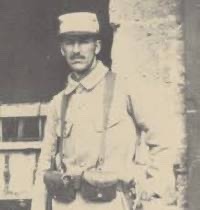
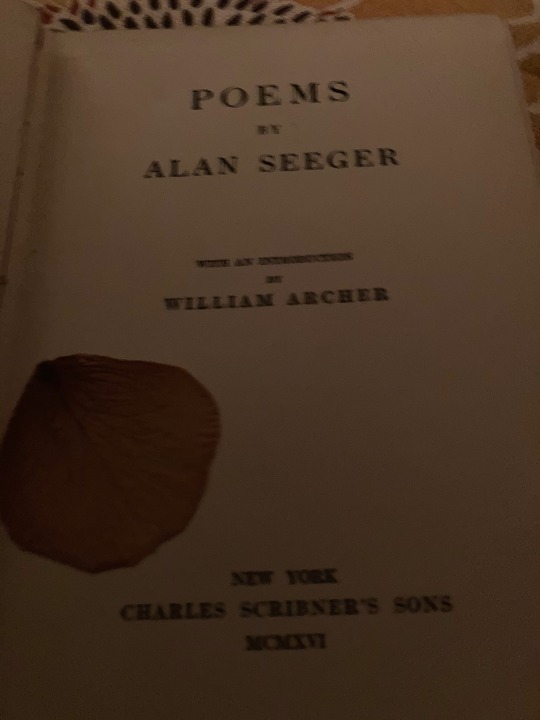



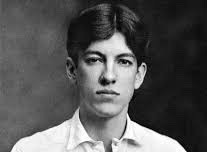
#alan seeger#wwi war poets#poetry#poetic#poets corner#world war one#thank you Alan Seeger Vera Brittain Wilfred Owens Siegfried Sassoon and many more poets for teaching me how to find my voice#edmund blunden#edward thomas#vera brittain#roland leighton#isaac rosenberg#charles shorley#william hodgson#siegfried sassoon
1 note
·
View note
Text
Edmund Blunden Sketch (1) 2023
After a lengthy pause, I am returning to the project of sketching portraits of the War Poets of The Great War. It’s been 3 years (!) since I did my sketch of Robert Graves, but I’m back with a portrait of Edmund Blunden, whom I featured on the blog once before. This time I’m including one of his other poems but please do follow the link to the previous Blunden post to read Thiepval Wood and the…

View On WordPress
#art#artist#drawing#Edmund Blunden#pencil drawing#pencil sketch#poetry#sketch#the great war#war poets#WWI
0 notes
Text
Poem of the Day 7 July 2020
The Festubert Shrine BY EDMUND BLUNDEN
A sycamore on either side
In whose lovely leafage cried
Hushingly the little winds —
Thus was Mary’s shrine descried.
“Sixteen Hundred and Twenty-Four”
Legended above the door,
“Pray, sweet gracious Lady, pray
For our souls,”—and nothing more.
Builded of rude gray stones and these
Scarred and marred from base to frieze
With the shrapnel’s pounces—ah,
Fair she braved War’s gaunt disease:
Fair she pondered on the strange
Embitterments of latter change,
Looking fair towards Festubert,
Cloven roof and tortured grange.
Work of carving too there was,
(Once had been her reredos),
In this cool and peaceful cell
That the hoarse guns blared across.
Twisted oaken pillars graced
With oaken amaranths interlaced
In oaken garlandry, had borne
Her holy niche—and now laid waste.
Mary, pray for us? O pray!
In thy dwelling by this way
What poor folks have knelt to thee!
We are no less poor than they.
0 notes
Text
If the troops were constantly reminded by transmissions like these how ironically close England was, those at home were kept equally mindful of how near the trenches were. And not just by assertions to that effect by editors and politicians. They could literally hear the war, at least if they lived in Surrey, Sussex, or Kent, where the artillery was not only audible but, with the wind in the right direction, quite plainly audible. When the mines went off at Messines, not merely was the blast heard in Kent: the light flashes were visible too. The guns were heard especially during preparation for a major assault, when they would fire unremittingly for a week or ten days, day and night. Thus Edmund Blunden recalls that in late June, 1916, as the artillery strove to cut the German wire for the Somme attack, “in Southdown villages the schoolchildren sat wondering at that incessant drumming and rattling of the windows.” The preparation at Passchendaele was “distinctly” audible to Kipling at Burwash, Sussex, 100 miles from the guns.
see this is why i need to only read about the war & canada. how can i learn something like this and not go crazy
1 note
·
View note
Photo
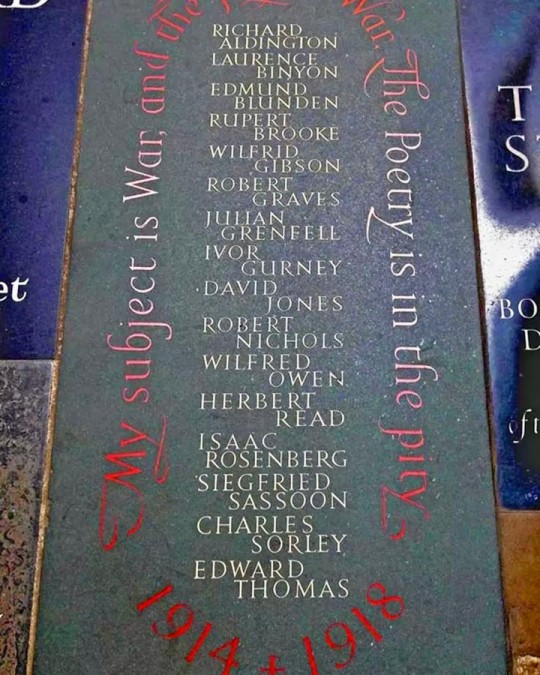
Poets of the First World War Sixteen poets of the Great War (World War I) are remembered on this memorial: - Richard Aldington (1892-1962) - Laurence Binyon (1869-1943) - Edmund Blunden (1896-1974) - Rupert Brooke (1887-1915) - Wilfred Gibson (1878-1962) - Robert Graves (1895-1985) - Julian Grenfell (1888-1915) - Ivor Gurney (1890-1937) - David Jones (1895-1974) - Robert Nichols (1893-1944) - Wilfred Owen (1893-1918) - Sir Herbert Read (1893-1968) - Isaac Rosenberg (1890-1918) - Siegfried Sassoon (1886-1967) - Charles Sorley (1895-1915) - Edward Thomas (1878-1917) None of the poets are actually buried in the Abbey. The stone is of Westmoreland slate, cut by Harry Meadows. The inscription in red lettering around the names reads: My subject is War, and the pity of War. The Poetry is in the pity The date "1914+1918" appears at the base. The idea for this memorial came from the Dean of Westminster, Edward Carpenter, who initially thought that five or seven poets could be chosen to represent all the poets of the Great War. He consulted with eminent historians and authors to ask for their suggestions. From those suggestions a final list of sixteen representative poets was drawn up and funding was obtained. https://www.instagram.com/p/Cd_QajfLPr-/?igshid=NGJjMDIxMWI=
2 notes
·
View notes
Text
Birthdays 11.1
Beer Birthdays
Ferdinand Rodenbach (1714)
Benjamin Lee, Baronet Guinness (1798)
Petrus Van Roy (1830)
Arthur Edward Guinness, Lord Ardilaun (1840)
Edmund Fitzgerald (1847)
Henry Schupp (1868 or 69)
Five Favorite Birthdays
William Merritt Chase; artist (1849)
Toni Collette; Australian actor (1972)
Larry Flynt; magazine publisher (1942)
Charlie Kaufman; screenwriter (1958)
Edward Said; Palestinian writer (1935)
Famous Birthdays
Rick Allen; rock drummer (1963)
"Whispering" Bill Anderson; songwriter (1937)
Sholem Asch; Polish writer (1880)
Jules Bastien-Lepage; French artist (1848)
Bo Bice; singer and musician (1975)
Edmund Blunden; English author, poet (1896)
Barbara Bosson; actor (1939)
Hermann Broch; Austrian-American author (1886)
Jan Brożek; Polish mathematician, astronomer (1585)
Tim Cook; Apple Inc. CEO (1960)
Stephen Crane; writer (1871)
Jan Davis; astronaut (1953)
Louis Dewis; Belgian-French painter (1872)
Lou Donaldson; saxophonist (1926)
Richard "Kinky" Friedman; rock singer (1944)
Nordahl Grieg; Norwegian poet (1902)
Michael D. Griffin; physicist and engineer (1949)
Sophie B. Hawkins; rock musician (1967)
Ted Hendricks; Green Bay Packers/Colts/Raiders LB (1947)
Shere Hite; writer, researcher (1942)
Eugen Jochum; German conductor (1902)
Mitch Kapor; Lotus & EFF founder (1950)
Roger Kellaway; pianist, composer (1940)
George Kenner; German-American painte (1888)
Anthony Kiedis; rock singer (1962)
James Kirkpatrick; television journalist (1920)
Robert B. Laughlin; physicist (1950)
Lyle Lovett; singer, songwriter (1957)
L.S. Lowry; British artist (1887)
Jenny McCarthy; model, actor (1972)
Ken Miles; English-American race car driver (1918)
Philip Noel-Baker; Canadian politician, activist (1889)
Gary Player; golf player (1935)
Aishwarya Rai; Indian actor (1973)
Grantland Rice; writer (1880)
Barry Sadler; songwriter (1940)
Jim Steinman; rock songwriter (1947)
Rachel Ticotin; actor (1958)
Fernando Valenzuela; Los Angeles Dodgers P (1960)
Marcia Wallace; actor (1942)
0 notes
Text
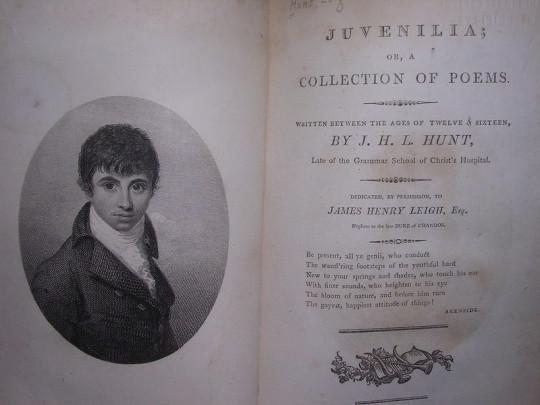
Juvenilia; or, a Collection of Poems Written between the ages of Twelve and Sixteen by J. H. L. Hunt, Late of the Grammar School of Christ's Hospital, commonly known as Juvenilia, was a collection of poems written by James Henry Leigh Hunt at a young age and published in March 1801.As an unknown author, Hunt's work was not accepted by any professional publishers, and his father Isaac Hunt instead entered into an agreement with the printer James Whiting to have the collection printed privately. The collection had over 800 subscribers, including important academics, politicians and lawyers, and even people from the United States. The critical and public response to Hunt's work was positive; by 1803 the collection had run into four volumes. The Monthly Mirror declared the collection to show "proofs of poetic genius, and literary ability", and Edmund Blunden held that the collection acted as a predictor of Hunt's later success. Hunt himself came to despise the collection as "a heap of imitations, all but absolutely worthless", but critics have argued that without this early success to bolster his confidence Hunt's later career could have been far less successful.
By Wikipedia
#Juvenilia#front page#a Collection of Poems Written between the ages of Twelve and Sixteen by J. H. L. Hunt#poetry#James Henry Leigh Hunt#1801#the romantic era
0 notes
Text
about
this is book is one of my favourite poetry anthology collections.
i have seen snippets of the introduction by martin taylor posted but i have never seen the full contents posted anywhere in any pdf or epub form. i don’t think i’ll be able to post the entire book (for obvious reasons) but i thought i would share the chapter contents so fellow scholars of the great war can find copies of the poems contained in their own way and enjoy.
i recommend reading paul fussell's 'the great war and modern memory' after or alongside this book.
feel free to message me if there is a specific page you are looking for, i can scan requests if you’d like.
cheers.
the ISBN for this book is 9780715631454.
About Martin Taylor (from the inside flap of this book) - “Until his untimely death in 1996, Martin Taylor was a librarian at the Imperial War Museum. He was also the author of a biography of Edmund Blunden, Overtones of War (published by Duckworth, 1996).”
0 notes
Text
On the green they watched their sons
Playing till too dark to see,
As their fathers watched them once,
As my father once watched me
Edmund Blunden

1 note
·
View note
Quote
As for Wilfred O., his unaliveness will never be anything but what it was at the end of 1918 – a dead loss – magnificent though his remains are. With him as a guide, I might have become a better poet. And what he left unwritten doesn’t bear thinking of.
Siegfried Sassoon to Edmund Blunden, 16 June 1953
95 notes
·
View notes
Photo

Edmund Blunden, Undertones of War
#world war one#dead#death#scottish#soldier#edmund blunden#corpse#wwi#ww1#great war#kneeling#undertones of war#thiepval
14 notes
·
View notes